Should meme culture shape how brands market to younger, digitally native audiences? Airlines and travel brands like Jet2Holidays and Ryanair have been leaning into viral culture. EasyJet recently tapped into this space by naming the “Ibiza final boss” — a viral club-goer turned internet sensation — as the new face of Ibiza in its latest campaign. To understand how these meme-driven moments resonate with the public, a YouGov Surveys: Self-serve poll among UK adults explores awareness of viral travel content, the types of meme-based posts consumers enjoy, and whether such moments actually influence brand or destination interest.
Jet2’s viral jingle lands best among the public
More than half of respondents (55%) say they have seen or heard the “Nothing beats a Jet2holiday” viral content, making it the most widely recognised travel-related reference in the poll. The “Ibiza final boss” trend — which recently made headlines with interviews of the man behind the viral dance move — was familiar to around one in four (26%). Ryanair’s cheeky tweets are recalled by 10% of those surveyed. More than a third (38%) say they hadn’t come across any of these memes.
It’s no surprise that younger generations are more aware of viral trends with 87% of Gen Z and 76% of Millennials saying they’ve seen or heard of ‘Nothing beats a Jet2holiday’.
Humour and relatability lead in travel content appeal
When asked what types of travel-related meme content they enjoy, 35% of respondents pointed to “funny situations on holiday” as their top choice. About one in five (21%) enjoy “relatable travel fails,” while 13% are interested in behind-the-scenes content from travel brands. Ultimate travel challenges (8%) and “destination glow-up” reels (7%) — have smaller appeal.
More than two-fifths (42%) say they don’t enjoy any of these types of travel meme content, and 8% were unsure, suggesting a sizable portion of the public remains disengaged from this genre.
Viral content has limited pull on travel intent
Despite the popularity of certain memes, only 3% of respondents say a viral travel-related meme would make them very likely to consider a destination or brand. A further 17% are somewhat likely to be influenced. In contrast, over half of adults surveyed say they re either not very likely (25%) or not at all likely (31%) to be swayed by such content. Another 23% were neutral.
Most say memes don’t change how they feel about a destination
When asked how they typically respond to seeing a destination featured in a viral meme or video, 37% say it makes no difference in how they feel. While 21% report curiosity, though not enough to book, around 5% say it actually makes them want to visit the place more. Interestingly, 12% said viral content could put them off visiting a destination altogether.
While meme-based content such as “Nothing beats a Jet2holiday” clearly cuts through in terms of awareness, the survey results suggest that engagement does not always translate into action. For travel brands, going viral may help with brand visibility but converting that attention into travel bookings likely requires more than just a meme.
Methodology: YouGov polled 1000 UK adults on 14 August 2025. The survey was carried out through YouGov Surveys: Self-serve. Data is weighted by age, gender, political affiliation, education level and region. Learn more about YouGov Surveys: Self-serve.
Image: Getty Images
